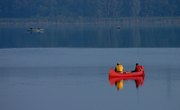While golf and tennis are the best-known outdoor tournament sports, fishing tournaments have been around for decades. The most famous are the Bass Anglers Sportsmen Society (BASS) tournaments, but tournaments are now devoted to the love of other species or just to the sport in general.
Basic Steps
Determine the purpose and scope of the tournament. It might be to promote sport fishing, to test the skills of the participants, to provide fellowship and camaraderie among the participants, or something else. Will this be a small one-time event, or part of something bigger?
Develop an organization to oversee the tournament, dividing the duties of planning and promotion among the group's members.
Choose the tournament date and location, and the species of fish that will be targeted by fishermen. Most freshwater tournaments focus on one species, such as largemouth bass or walleye.
Contact the state agency that oversees fishing regulations in the state where the tournament will be staged for both the state's bag limits, as well as to obtain any necessary permits to conduct the tournament.
Draft the contest rules and post them on the tournament website. Rules should cover entry fees and prize structure, scoring methods (total weight or point system), limits on number and size of fish (especially if more restrictive than state regulations), and rules on the handling of fish. Many fishing tournaments support bringing fish in alive and releasing them after weigh-in.
Organizational Responsibilities
Appoint a coordinator to oversee the efforts of all of the people assigned to tasks.
Pick someone responsible for promoting the event through posters, newspaper advertising, radio, television and the Internet.
Have someone serve as the liaison with the state agency that oversees fishing and fishing tournaments.
Get a mailing list of possible contestants from local fishing clubs or the like and send each prospective contestant an entry form and complete rules.
Arrange for lodging for all the fishermen competing in the tournament. This can be as simple as booking a campsite or as sophisticated as securing rooms in a nearby hotel.
Provide food for all of the anglers. Lunch can be sandwiches and soda given to each fisherman before he sets out, because the anglers will probably spend lunch hour on the water, while breakfast and dinner should be sit-down meals.
Contact local organizations as well as fishing equipment manufacturers to be sponsors and to provide prizes for the event.
Writer Bio
This article was written by the CareerTrend team, copy edited and fact checked through a multi-point auditing system, in efforts to ensure our readers only receive the best information. To submit your questions or ideas, or to simply learn more about CareerTrend, contact us [here](http://careertrend.com/about-us).


